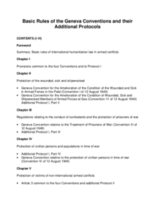The aim of this document is to provide a condensed synthesis of the rules of international humanitarian law in armed conflicts as contained in these legal instruments. This presentation itself is preceded by a summary which sets out, as simply and briefly as possible, the fundamental rules which are the basis of these treaties and the law of armed conflicts as a whole. Prepared for dissemination purposes, this work cannot in any circumstances serve as a substitute for the complete provisions of the international agreements to which the marginal notes refer.
The basic rules of international humanitarian law in armed conflicts include:
-
Persons hors de combat and those who do not take a direct part in hostilities are entitled to respect for their lives and their moral and physical integrity. They shall in all circumstances be protected and treated humanely without any adverse distinction.
-
It is forbidden to kill or injure an enemy who surrenders or who is hors de combat.
-
The wounded and sick shall be collected and cared for by the party to the conflict which has them in its power. Protection also covers medical personnel, establishments, transports and equipment. The emblem of the red cross or the red crescent is the sign of such protection and must be respected.
-
Captured combatants and civilians under the authority of an adverse party are entitled to respect for their lives, dignity, personal rights and convictions. They shall be protected against all acts of violence and reprisals. They shall have the right to correspond with their families and to receive relief.
-
Everyone shall be entitled to benefit from fundamental judicial guarantees. No one shall be held responsible for an act he has not committed. No one shall be subjected to physical or mental torture, corporal punishment or cruel or degrading treatment.
-
Parties to a conflict and members of their armed forces do not have an unlimited choice of methods and means of warfare. It is prohibited to employ weapons or methods of warfare of a nature to cause unnecessary losses or excessive suffering.
-
Parties to a conflict shall at all times distinguish between the civilian population and combatants in order to spare civilian population and property. Neither the civilian population as such nor civilian persons shall be the object of attack. Attacks shall be directed solely against military objectives.
©United Nations

